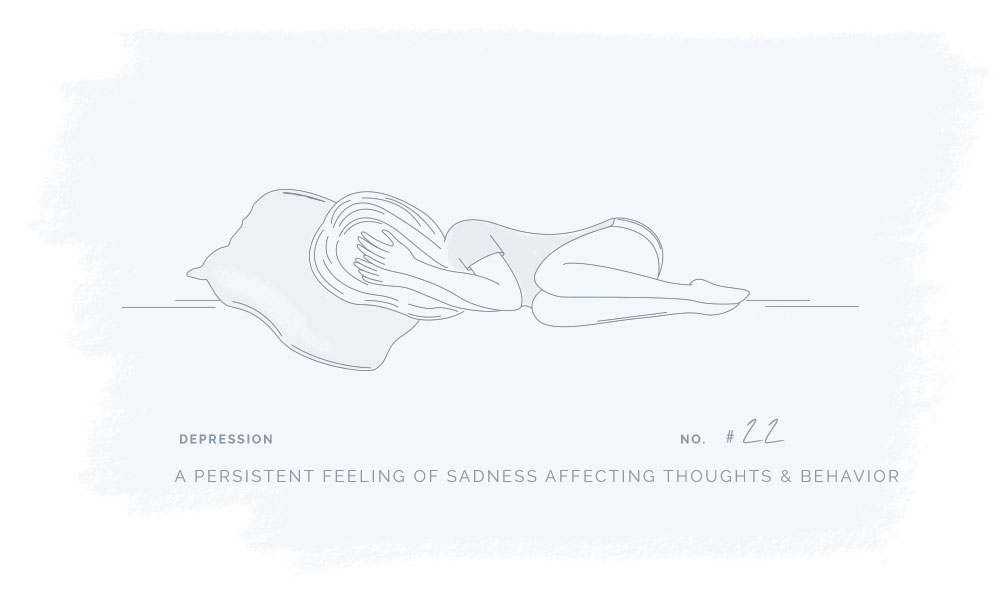Depression
Category
Behavioral, Neurodevelopmental, Psychiatric
REVIEWED BY
Our Biomedical Scientist
Reviewed based on
Literature Discussion
Last update
August 2020

What is Depression
Depression also is known as major depressive disorder is a mental disorder that affects how one feels, thinks, and behaves and can lead to other emotional and physical problems. Depression often causes a persistent feeling of sadness and can interfere with most aspects of life.1
Symptoms
Signs and symptoms of depression in kids and teenagers have similarities with adults, but there can also be some differences. For most individuals, the symptoms of depression are so severe that it interferes with daily functioning.1
The most common symptoms may be:
- Persistent feelings of sadness, emptiness, anxiety, restlessness, and hopelessness
- Difficulty with memory, concentration, and making decisions
- Short temper and self-blame
- Reduced appetite and weight loss or increase appetite and weight gain
- Loss of interest in normally enjoyable activities
- Change in sleeping patterns e.g. insomnia or sleeping too much
- Suicidal thought or recurrent thoughts of death
- Unexplained physical problems
Cause
Up to this date, the exact cause of depression is not yet known. Factors that can increase the development of depression are:1
- Physical changes in the brain
- Hormonal changes
- Genetics
- Changes in the function and effect of neurotransmitters involved in controlling mood
The connection between Cannabinoids & Depression
Studies find that CBD and THC may have great therapeutic potential and may be used to help treat Depression. CBD and THC are well-known cannabinoids, however, they do not have the same psychoactive effects. THC is psychoactive while CBD does not possess psychoactive effects. According to WHO guidelines, the cannabidiol CBD is generally well tolerated with a good safety profile.
Preclinical evidence proposes that the cannabinoids CBD, CBG, CBC , and especially THC may be therapeutic in the treatment of depression, as these cannabinoids may possess anti-depressant properties.2
In addition, it is suggested that the endocannabinoid system plays a role in the development and treatment of depression.3
The literature discussion is an overview of the published results from scientific studies investigating if and how cannabinoids can be beneficial in the treatment of Depression. The overview will be updated regularly to ensure the newest and most accurate information.
CBD may possess anti-depressant properties
In animal models for depression (forced swimming and tail suspension tests), Δ9THC was found to exert anti-depressant effects at 2.5 mg/kg. Similarly, CBD (200 mg/kg) and CBC (20 mg/kg) were shown to have anti-depressant properties, whereas CBG CBN did not produce anti-depressant effects.4
In rats, antidepressant-like activities were exhibited by administration of CBD into the ventromedial prefrontal cortex, possibly through indirect activation of CB1 and
5-HT1A .6
CBG may activate cannabinoid receptors useful in treatment of depression
Another study showed that the plant cannabinoid CBG can activate α2 receptors, interact with CB1 and CB2 as well as block CB1, proposing that CBG may have a therapeutic potential in treating depression.5
Patients with depression may benefit from exercise
Exercise has been found to be helpful for patients with AD and depression. In a study with rats, exercise caused the formation of new neurons in the hippocampus. Furthermore, in the hippocampus (but not in the prefrontal cortex), anandamide levels (and to lesser degree 2AG levels) and CB1 receptor availability were elevated.7
Targeting the endocannabinoid system may have therapeutic potential
Blocking the endocannabinoid system can affect the formation of new neurons (i.e. prevent new neuron generation), proposing that cannabinoids are involved in this process.7
In one study with mice, it was shown that oral OEA (1.5 – 6 mg/kg) ameliorated depression-like behaviors, proposing that OEA may have a therapeutic potential in the treatment of depression.8
Clinical trials are research studies that examine new treatments and evaluate their effects on human health outcomes.
Today, we are not able to provide any clinical trials about cannabinoids and Depression.
- https://www.mayoclinic.org/diseases-conditions/depression/symptoms-causes/syc-20356007
- https://ghmedical.com/endocannabinoid-system/diseases/depression
- Poleszak, E., Et al.,(2018). “Cannabinoids in depressive disorders”. https://pubmed.ncbi.nlm.nih.gov/30290188/
literature - El-Alfy et al., (2010). ” Antidepressant-like effect of delta9-tetrahydrocannabinol and other cannabinoids isolated from Cannabis sativa L. Pharmacol. Biochem. Behav. 95, 434–442”. https://pubmed.ncbi.nlm.nih.gov/20332000/
- Cascio et al., (2010). ” Evidence that the plant cannabinoid cannabigerol is a highly potent alpha2-adrenoceptor agonist and moderately potent 5HT1A receptor antagonist. Br. J. Pharmacol. 159, 129–141”. https://pubmed.ncbi.nlm.nih.gov/20002104/
- Sartim et al., (2016). ” Antidepressant-like effect of cannabidiol injection into the ventral medial prefrontal cortex – possible involvement of 5-HT1A and CB1 receptors. Behav. Brain Res”. https://pubmed.ncbi.nlm.nih.gov/26801828/
- Hill et al., (2010). “Endogenous cannabinoid signaling is required for voluntary exercise-induced enhancement of progenitor cell proliferation in the hippocampus. Hippocampus 20, 513–523”. https://pubmed.ncbi.nlm.nih.gov/19489006/
- Jin et al., (2015). ”Antidepressant-like effects of oleoylethanolamide in a mouse model of chronic unpredictable mild stress. Pharmacol. Biochem. Behav. 133, 146–154”. https://pubmed.ncbi.nlm.nih.gov/25864425/
CANNABINOIDS & RECEPTORS
Below you find the plant cannabinoids, cannabinoid receptors, and endocannabinoids that are associated with the potential therapy.
If you have any further information relevant to the connection between Depression and cannabinoids or find any of the information inaccurate, outdated or incomplete please contact us here.

